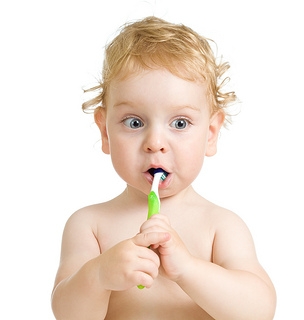January 18th, 2017

Drs. Sidney and Jacob Kelly and our team know it can be a challenge to get our children to brush, brush well, and brush often. Here are some tips that can help you keep those beautiful little teeth healthy.
Make it Fun, Make it a Habit!
We should all brush twice a day. The most important time to brush is at night before bed. When we sleep, our saliva production decreases, and this creates an environment for oral bacteria to cause greater destruction to our teeth and gums. Brushing should last at least two minutes, followed by flossing and mouthwash if you choose.
Here are some ideas to make this nightly ritual more entertaining.
- Set a good example. Brush your teeth with your children and make it fun! Pick a song to play while brushing.
- Make it a race to the bathroom to see who can get their toothbrush and floss ready. But don’t make it a race to finish; make sure brushing lasts at least two minutes.
- Try using a sticker sheet. For every night your children brush well, give them a sticker. (Be sure to check their work.) After a certain number of stickers, they earn a reward. Let them pick the reward! As the child improves at brushing every night without reminders, you can wean her or him from the reward.
- SPECIAL TIP: Let your child check your brush work!
As parents, we should help our children make health and wellness something to take pride in. Be gentle with your children when they make mistakes, whether forgetting to brush or maybe developing a cavity. Tell them even our team at Sidney D. Kelly, DMD Family and Cosmetic Dentistry gets cavities. Thankfully, there is always room for improvement. Happy brushing!
January 11th, 2017

According to the Centers for Disease Control and Prevention, half of adults age 30 and over suffer from some form of gum disease. Caused by plaque buildup, gum disease is an infection of the tissue that surrounds and supports the teeth. In its advanced stages, it is known as periodontal disease. If left untreated, it can result in the loss of tissue and bone that support the teeth, causing teeth loss. It’s a preventable condition seen far too often by Drs. Sidney and Jacob Kelly.
Research between periodontal disease and other diseases is ongoing. Some studies have indicated that gum disease is linked to other health conditions such as stroke or diabetes. Furthermore, while most factors that lead to periodontal disease are dependent on the individual (genetics, diet, poor oral hygiene) there is a possibility that periodontitis is capable of spreading from one person to another.
What the Research Says
Periodontitis is a gum infection, and the bacteria that cause the gums to become infected travels in saliva. Researches have used DNA coding techniques to track the path of infection from one person to another. In other words, kissing and close contact play a role in the transmission of the infection, so if you’re married to a spouse with periodontal disease, then your chances of having gum problems are slightly increased. Other studies have indicated that saliva contact is common in family settings through coughing, sneezing, and shared utensils and food. Children with parents who have periodontal disease are at a somewhat higher risk of developing it. At the same time, just because you exchange bacteria with your loved ones doesn’t mean you will get periodontal disease.
It is important to note that the scientific evidence supporting the spread of periodontal disease is limited and ongoing. The best way to prevent gum disease is through proper plaque control, which includes brushing, flossing, mouthwash, and twice a year trips for professional cleanings. Contact our Roseville, CA office if you have any questions about periodontal disease.
January 4th, 2017

At Sidney D. Kelly, DMD Family and Cosmetic Dentistry, we have patients coming in asking us why a taste of ice cream or a sip of coffee becomes a painful experience, or why brushing or flossing makes them wince or cringe. The answer, usually, is sensitive teeth. Tooth sensitivity typically occurs when the underlying dentin layer of the tooth is exposed in the oral cavity, and most people experience tooth sensitivity at some point in their lives.
So, why do people experience sensitivity and how do you know if tooth sensitivity is something to be worried about? The most common cause of the sensitivity is exposure of the dentin, which is the layer surrounding the tooth’s nerve. Contributors to tooth sensitivity include teeth whitening and dental work such as fillings, periodontal treatment, and the placement or adjustment of braces. These are temporary and should be of no concern.
Permanent hypersensitivity, however, may require treatment at Sidney D. Kelly, DMD Family and Cosmetic Dentistry. The first step is to determine the cause, and that begins with a visit to our Roseville, CA office.
The reasons your teeth may become sensitive vary, but possible causes include:
- Tooth decay (cavities) near the gum line
- Cracked or fractured teeth
- Fillings that are worn
- Gum (periodontal) disease, or recession of the gums
- Worn tooth enamel
- Brushing too hard
- Consuming acidic foods
Drs. Sidney and Jacob Kelly and our team at Sidney D. Kelly, DMD Family and Cosmetic Dentistry want you to know that sensitive teeth can be treated, and the type of treatment will depend on what is causing the sensitivity. Drs. Sidney and Jacob Kelly may suggest one the following treatments:
- Desensitizing toothpaste, which contains ingredients that seal off the microtubules inside the exposed dentin to reduce tooth sensitivity
- Fluoride gel, which strengthens compromised tooth enamel, helps prevent tooth decay, and decreases hypersensitivity of the teeth
- A crown, inlay, or bonding, which is used to treat tooth decay and prevents sensitivity
- A surgical gum graft. If gum tissue has been lost from the root, this procedure will protect the root and reduce sensitivity.
- Root canal: If you are experiencing severe and persistent sensitivity which cannot be treated by other means, Drs. Sidney and Jacob Kelly may recommend you undergo a root canal to eliminate the problem.
If you are experiencing tooth sensitivity, give us a call today so that Drs. Sidney and Jacob Kelly can provide you with some much-needed relief!
December 21st, 2016

When a child is born, he or she will have 20 primary teeth and 32 permanent teeth. But sometimes kids are born with additional teeth, and our team at Sidney D. Kelly, DMD Family and Cosmetic Dentistry calls this oral condition "hyperdontia." Primary teeth are the first set of teeth that erupt in your child's mouth, typically by the time they are 36 months old, and are shed by the time your child reaches the age of 12. Permanent teeth then take the place of the primary teeth and are usually fully-erupted by the time your son or daughter reaches 21 years of age. Anyone who develops more than 20 primary teeth or more than 32 permanent teeth has hyperdontia, and the additional teeth are referred to as supernumerary teeth.
While the cause of hyperdontia is not entirely clear, it is believed that there may be a genetic factor. Oral professionals have found that patients with extra teeth often have syndromes like cleidocranial dysplasia, Ehler-Danlos syndrome, Gardner syndrome, or cleft lip and palate. The prevalence of hyperdontia affects between one and four percent of the population in the United States, and the majority of cases are limited to a single tooth.
So, what is the best way to deal with hyperdontia? It really depends on the case. The treatment plan your doctor suggests varies according to the potential problem posed by the supernumerary teeth, as well as their type. Orthodontic treatment may certainly may help, but extraction can also be a good option. We recommend that children receive an oral evaluation or checkup no later than the age of seven. In addition to hygiene evaluation, this helps ensure your child does not experience hyperdontia problems.
If you suspect you or your child may be suffering from hyperdontia, please give us a call to schedule an appointment at our convenient Roseville, CA office to be evaluated.




